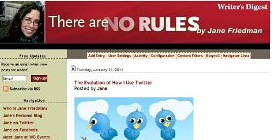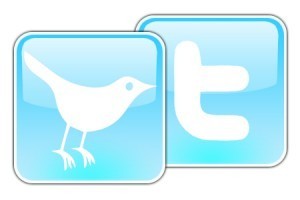Jane Friedman's Blog: Jane Friedman, page 209
July 27, 2011
Build Diversity Into Your Online Presence
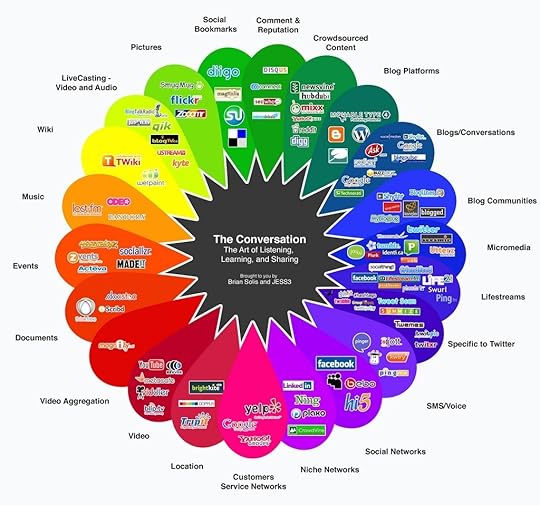
Conversation Prism by Brian Solis and JESS3
Back in 2008, a smart guy named Brian Solis created the Conversation Prism (above), and wrote a blog post titled State of Social Media 2008.
2008 is eons ago in new media terms—but the post is worth revisiting, especially for writers just now learning how to integrate online media into their everyday life. While not all of his points apply to individuals (his advice is extremely corporation focused), here are a few points to keep in mind:
Social media is a means, not an end—which is why I so dislike discussions and blog posts about how social media "doesn't work" to sell books!
Social media can gather people around common passions.
It takes more than an understanding of the tools to build meaningful relationships. It takes a human touch—an ability to send a genuine, authentic message. Therefore, social media can best be defined through sociology, rather than technology.
Listeners make the best conversationalists. (See prism above for listening channels.)
A few points I'd like to make:
If you interact with people in ONLY one place (or one section of the "prism"), then you put yourself at risk of losing your network when people go elsewhere. I can guarantee you: Tools and networks come and go. Friendster and MySpace gave way to Facebook. Maybe Facebook will give way to Google Plus. Blockbuster gave way to Netflix. Maybe iTunes will give way to Spotify. Etc. I'm not advocating social media schizophrenia. HOWEVER, part of being a successful author is knowing where your audience is headed, and adapting (not complaining).
If you focus all your energies on one channel or outlet, what happens if you must leave it—or if it disappears? Or if the rules change? To use myself as an example, if I had limited myself to content and conversations through my Writer's Digest blog, I would've lost most of that community by walking away. But I have networks in a variety of places, so I can transition when needed. Without Facebook, Twitter, and LinkedIn, you probably wouldn't be reading this post right now.
Build and enable a community of your own that no one can take away. If you're an author, and you rely completely on your publisher (and/or bookstores) to reach readers, what happens if/when those things go away? What happens if they don't want to work with you any more? What if you don't like their terms any more? How do you reach the same readers or audience as before? I hope you're already thinking through your strategies to address these challenges.
Part of my motivation for stepping away from No Rules was to build content and a network that wasn't under the control of a company. I began this process awhile ago, when I started my own e-mail newsletter list, and I've been filling in the colors of my prism through Twitter, Facebook, LinkedIn, and other sites.
If I lose or transition away from my network or community, I want it to be because of something I did, rather than a situation inflicted upon me, or due merely to the winds of technological change.
July 26, 2011
Jane's Writing Advice Archive
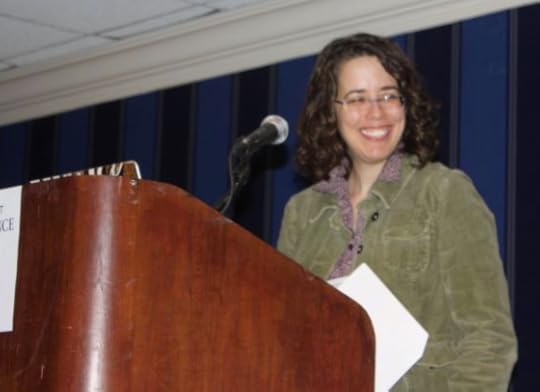
Jane speaking at the 2011 Writer's Digest Conference
I've been offering writing and publishing advice for a long time.
So I thought it might be time to create a handy archive of what's available online, especially for those who haven't been following me since the very beginning.
If you know of something wonderful I've written that isn't included here—or if you're looking for something you can't find—let me know. I'll try to remedy!
July 25, 2011
The End of an Era: Goodbye to There Are No Rules
On the last day of April 2008, I launched my first professional blog, There Are No Rules.
Every day since then, I've thought about what to tell writers that would be helpful, insightful, and a little bit provocative.
While I will no longer be posting my perspective at No Rules (though the archives will remain with Writer's Digest), here at JaneFriedman.com, you can still get my perspective—and participate in a conversation with me—on writing, publishing, and the future of media.
One thing's for sure: I'll be raising the bar, and offering more challenging content. My goal is still to help writers (as well as all creative media professionals) be knowledgeable, proactive, and better in touch with where it's all headed—and how to engage, adapt or resist. All options are on the table.
Thanks for visiting me here, and I hope I continue to deserve your time.
When Mom Was My Age (#40)
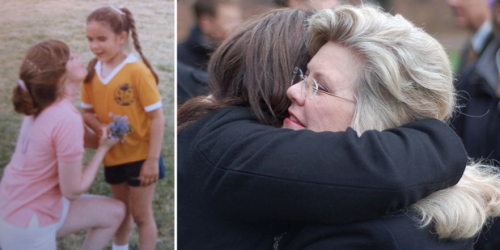
Pam & Sarah Brown (Mother's Day, 1984) & on Sarah's wedding day (December 2010)
"When Mom Was My Age" is an interview series between daughters and mothers. New interviews appear every Monday. If you would like to participate, contact Jane.
The following interview is with Pam Brown (age 61), reflecting on her life at age 34, interviewed by daughter Sarah Brown.
When you were my age (34), where did you live?
I lived in Tulsa, Oklahoma, in the second house that your dad and I owned during our then ten years of marriage. It was a one-story home with three bedrooms, two baths, and a long-yearned-for wood-burning fireplace.
The house was nothing special when we bought it, but we rather enjoyed the feeling that came from turning a so-so house into something pretty. We knew we could improve this one because when we first saw the house, the outside was painted a shocking fluorescent coral! So, just as we had done in the first home we lived in when you were born, we spent five years painting, wallpapering, carpeting, and landscaping until it was a very pretty, cozy home.
Your bedroom was painted pale chiffon yellow, with white eyelet curtains, and it was filled with dozens of stuffed animals and a bazillion of your favorite thing—books!
What was your typical day like?
1984 was an extremely rough year for our family. The year started very happily. You were 6½ years old when I turned 34 the first week of January. A week later I gave birth to your baby brother Stephen. We were ecstatic, just as we had been with you. I had suffered two miscarriages, but now we had two beautiful children, a girl and a boy. I was so happy!
Due to my C-section, my "typical" days didn't start for a while. Even as things got back to normal, the morning rituals were still a bit hard on us all. Stephen was not a sleeper and most nights your dad and I were trading off rocking him and walking him up and down the hall for hours.
You couldn't sleep either. We'd get you off to school, and then I would just do the things all moms of new babies do. Feed him, rock him, change him, have lovely little conversations with him, try to get him to take a nap. If successful, I'd try to get in some chores, to nap myself, to read, or try to bathe before he was awake.
When you came home from school, the three of us would sit on the sofa and read stories together. You were a great big sister! You'd bring him toys and happily play with him while I started dinner. We would play with you both at night and of course read you stories at bedtime. They were wonderful typical days. If I hadn't had you and Stephen to care for, I don't know how I would have made it through the rest of what was happening.
My daddy was dying, and my husband's dad was dying too. Both had been battling lung cancer for over a year. My father was diagnosed first, and my father-in-law was diagnosed about 11 weeks later.
My father had just turned 61, the age I am right now. He was so positive he would beat this cancer just as he had beaten colon cancer. Instead it had progressed to brain cancer. I was devastated that this handsome silver-haired-executive Texas A&M graduate, who loved fishing, playing tennis, and telling Aggie jokes, actually could be dying. He was too young! It wasn't fair!
I kept thinking about all he would miss about you, and he might never even know Stephen. I would never know how he could leave his family after 27 years of marriage and marry someone else. And I knew that the bond I had tried to have my whole life with my dad would never happen, and I would never know why.
My father-in-law was a pretty grumpy old man on the exterior, but he and I had become closer. He shared feelings and tears with me that I don't think he had ever been able to share before. called him on his grouchy, bossy stuff, and he respected me for that. I sat with him during his chemotherapy, and I wanted desperately for him to live long enough to mend some of his relationships. I knew your father was hurting just as much as I was since their relationship had long been very strained.
My father died in late March, and my father-in-law died about 11 weeks later. Then those typical mommy days really started falling apart. I was so incredibly sad, but I tried to be a good mommy and keep things happy for you and Stephen. I sent out invitations to a group of little girls and their Cabbage Patch dolls to a fancy ladies' tea party, and they dressed up in their moms' dresses, high heels, hats and jewelry. I think that was the year you were a lovely redbird (with long pigtails) in a school play. For Halloween you were a magician in a black cape and top hat (with red glitter of course). Lots of wonderful moments were mixed in with long months of sadness and anger.
What did you worry about most?
Before our fathers died, I worried about them. I worried about my mother-in-law and how she would do. I worried a great deal about my mother, who had spent the 15 years since my father divorced her hoping and praying that he would come back, or at least that she would overcome her own sadness and anger.
Before my father's death, I spent a lot of time worrying about what I would say to him when we went to Chicago to visit him for probably the last time before he would die. And when that trip came and it was my last night there, I stayed awake all night crying and trying to think of what I needed to say to him or ask him. What did I really need to know to find some peace?
The next morning I sat by him on his bed. "Dad, someone told me [I left out that it was my stepmother] that you are very concerned that I am turning out to be so much like my mother. Very concerned. And since I know you have pretty bad feelings toward mother, I wonder how you feel about me."
He straightened up his frail body and said firmly, "That is a goddamn lie! I never said such a thing! First, I don't think you're anything like your mother! And I love you very much." He held me a long time and we cried silently and talked more.
So there it was. It had all boiled down to "Daddy, do you like me?" That moment was a huge gift to me.
I also worried about your dad. Since we had both lost our fathers, it was very hard to talk together. We were each afraid to share our sadness for fear of bringing the other one down even more. We went through grief counseling and that helped us.
I would lie in bed at night and feel guilty that I wasn't being as good a mommy to you and Stephen as I could be. Yes, I planned fun things for you, and you and I could talk about what was going on. But I knew that the first year of a baby's life was so important for bonding, and I felt I had been emotionally absent due to my grief. I worried that Stephen was picking upon my emotional distress. Rocking him or holding him would not comfort him. He would squirm and push away. I was sure it was my fault.
I didn't worry about normal stuff, like money. I just wanted to be in a nice home and always be with my husband and children. I admit that for way too long in my marriage I was worried that your father would leave me. I knew it was mostly because my dad had blindsided my mom and our family by leaving after 27 years. I didn't know if I could trust men, or trust love. Your father was so quiet, and I was always thinking I was making him unhappy. I've learned through our almost 38 years now just how wrong I was. He has stayed by me through good and bad times. He is such a good man.
I knew as early as junior high school that I worried too much about everything. I even carried little clippings from the newspaper in my purse to remind myself not to worry. "Worry is interest paid before it is due," and "Don't tell me not to worry. The stuff I worry about never happens."
I have worked very hard in the last few years to try to stop worrying. I've learned that worrying just wastes time and does nothing to stop anything.
What did you think the future held for you?
If someone had really pressed me to think about it back then, I probably would have answered that we would raise our children, probably buy one more house, take travel vacations when possible, educate the kids, maybe have grandchildren someday, retire and share many great times with the whole family.
Truth is, though, that I never really thought much at age 34 about what the future held for me. I do wish I had thought more about it. Our marriage even at 10 years was relatively new. We were very busy. We had sick parents, much younger than we ever thought that would happen. I knew that I wanted to stay at home to raise my children. I didn't think that was the way it HAD to be done to have your children turn out great. That's simply what your father and I agreed we would try to do. I consider myself lucky to have been able to do it, but I can't say for certain that it was the wisest thing to do for myself or even for my children.
Thank goodness that your father was always thinking about what the future might hold. Remember all those times when he would ask you where you pictured yourself being in five or ten years? Picture the goal, plan how to make it happen, and then keep working the plan. He was right, and I'm lucky he was thinking about it.
How do you look back on that age now?
Some days it seems like so long ago, but at other times it was just the other day. Basically, I look back on age 34 as very young! Every thing was possible. We could take so many different paths. I was young and had a lot of energy. I explored ways to teach my children, and I learned something new every day from them. We had so many fun times with you and your brother.
I also know that at 34 I had pretty low self-esteem. I doubted that I would be good out in the business world, whereas today I feel I could do anything if I set my mind to it and had enough time left. At 34 I felt I had to figure out everything, and now I'm much more able to sift through things and decide what I really care about knowing.
I also was very confused about what I had been taught about religion and God. I read many books, went to church, and took classes taught by a true scholar with vast knowledge of religion, history, language and science. Today I am completely comfortable with my higher power and feel that power and comfort all around me.
I wonder now just how that age could possibly be so far in my past. I feel basically the same in my heart and in my head as I did back then, except that hopefully I am a lot wiser. I was probably pretty naive at 34 about what life would bring. Even though some of the hardest times seemed like they lasted an eternity, life in general has absolutely flown by.
And here I am at 61 years old.
And life is good!
From Sarah
I knew the bare bones of all of these answers already, but some of the details made me cry. They also made me wish I had a time machine so I could go back and punch a few people on my mother's behalf, and give 34 year old Pam a hug. I'd tell her, "You are a loving mother and devoted wife, and your children and husband love you so much. And even if they tease you about your worrying and idiosyncrasies, it's all done with love, and the knowledge that they'd be nowhere without your care and attention to detail. So stop worrying and get some sleep: we all turn out happy, and not one of us has been in jail (as of July 2011)."
My mom encouraged creativity, for as far back as I can remember. One of the happiest moments of my life was hearing the joy in my mother's voice when I called her and told her I'd received my first book deal. She taught me to be confident, and that money isn't everything. She also taught me how to recognize the good people. I know it sounds trite, but my mother taught me how to show love, and I feel like that's helped me find the best people to share my life.
July 24, 2011
Best Tweets for Writers (week ending 7/22/11)
I watch Twitter, so you don't have to. Visit each Sunday for the week's best tweets. If I missed a great Tweet, leave it in the comments. Looking for more online content I love and recommend? Subscribe to my e-newsletter.
Best of the Best
Author Blogging: You're Doing it Wrong, but John Locke's Figured it Out
@lkblackburne
5 rookie writing mistakes that will expose your lack of storytelling experience by @storyfix
@dbschlosser
How to avoid the No. 1 problem in pitching a novel: Tell the STORY, not the theme!
@RachelleGardner
Publishing News + Trends
Excellent post. What happens to your business when you switch gears and focus on your friends instead?
@thecreativepenn
The lesson of Borders: Bookstores need to guide us by @R_Nash
@PublishersWkly
Interesting graphs about successful projects on @kickstarter
@selfpubreview
Marketing + Self-Promotion
My latest video interview: @Jenny_Blake shares TONS of tips for marketing your book
@DanBlank
Online Marketing for the Middle Grade Audience
@elizabethscraig
Social Media
6 Online Dating Tactics to Improve Your Facebook Fan Page
@elizabethscraig
Self-Publishing + E-Publishing
Everything You Wanted to Know About Digital Publishing But Were Afraid to Ask
@dearauthor
Why I Sell My Novel For 99 Cents
@thecreativepenn
Looking for a daily round-up of best tweets for writers?
Check out the "daily" right here!
Follow my Best Tweets for Writers list
July 22, 2011
How to Avoid Sabotaging Your Online Marketing Efforts
July 21, 2011
The Value of Experimentation
I've recently come to know and appreciate Brad
King's work, both as an innovative media professional, as well as a university
professor.
So I've been keeping an eye on a project that he and his talented students have launched: The
Invictus Writers.
There's a lot to say about it, but—in brief—for the first volume, each contributor
has written a personal essay about the moment in their lives when everything changed
as they moved into adulthood. Along the way, they've tinkered with a few elements
of publishing as well.
Here are some interesting stats:
To date, nearly
3,500 have read the essays on Scribd.
They launched a blog to discuss the process
of writing the book. To date, there have been about 3,600 page views on the blog,
which itself has 31 posts that were written by 7 authors.
They
put up a Facebook Page here.
They
created a 157-page print book that retails for $10. They also created a
PDF that retails for $2.99.
Soon they'll release an EPUB edition that will retail for $4.99.
Now I'd like to point out some things they did NOT do:
They did not wait for permission to collaborate.
They did not wait for someone to pay them to do or write what they cared about.
They did not query editors or agents asking for approval.
They did not look for a publisher to do what they could do very well on their own.
They did not wait to be discovered.
They did not angst over putting their work online.
They did not limit themselves to one format or channel.
They did not wait to learn everything first. They're experimenting and learning as
they go.
I hope you get my meaning.
[image error]
The Value of Experimentation
July 20, 2011
Looking Into the Future of Bookstores: 4 Angles
my Facebook page—and everywhere else online!—about the future of bookstores. Some
of the activity feels like examining the veins of the leaves on trees (e.g., I must
have the ability to read my paper book in the bath tub, dammit!).
Let's take a wider view. When you read and see the connections among the following
4 articles, you'll get a good grasp of the forest.
Where Will Bookstores Be Five Years From Now? by Mike Shatzkin
We have definitely passed what Michael Cader has
dubbed "peak bookstores" in the U.S. Shelf space for books is probably dropping faster
than the number of stores as book retailers look for other items to keep their customers
more satisfied and give those items space previously devoted to books. And shelf space
available for publishers who don't own bookstores is dropping faster than that because
Barnes & Noble, the leading provider of bookshelf display space, is aggressively
sourcing their own product both to improve their margins and to develop proprietary
product not available to their competitors.
Is
the Future of the Physical Book the Same the Same As the Future of Reading and Writing?
by Daniel Nester
My point is that the idea of what makes up readingAgainst Reviews,
is changing. Books are going to be read with increasingly more convenient digital
devices, and much of the nature of libraries and bookstores are going to change and
even go away.
That's not a bad thing, and it should not be breaking news for
people who are following things with a clear eye. The fear of what the future brings
takes over most people who think about books and reading and writing in a way I can't
understand or explain, other than to say it has something to do with nostalgia and
not a small dash of privileging one's experience over what will soon be another's.
As well as keeping one's job.
N+1 Magazine by Elizabeth Gumport
Not only do we not want to read about Gary Shteyngart's
latest novel, we don't even want to know it exists. Newness is not a fixed property.
There must be a less arbitrary, more sensible way to encounter books, an organizational
scheme better suited to identifying and highlighting excellence; one which doesn't
foreground mediocrities simply because they are the newest mediocrities. "Recent"
is not a synonym for "relevant."
What
Books Will Become by Kevin Kelly
In the long run (next 10-20 years) we won't pay
for individual books any more than we'll pay for individual songs or movies. All will
be streamed in paid subscription services; you'll just "borrow" what you want. That
defuses the current anxiety to produce a container for e-books that can be owned.
E-books won't be owned. They'll be accessed. The real challenge ahead is finding a
display device that will focus the attention a book needs. An invention that encourages
you onward to the next paragraph before the next distraction. I guess that this will
be a combination of software prompts, highly evolved reader interfaces, and hardware
optimized for reading. And books written with these devices in mind.
[image error]
Looking Into the Future of Bookstores: 4 Angles
Jane Friedman
- Jane Friedman's profile
- 1882 followers


